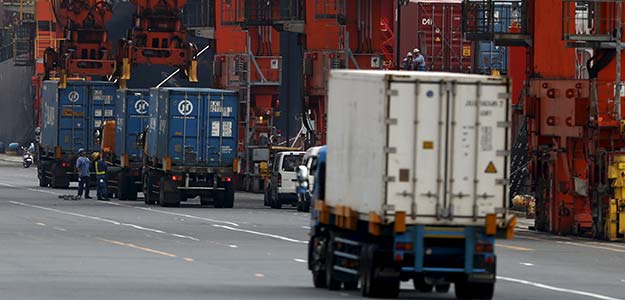

- Home/
- Top Stories/
- Davos Optimists See a New Era of Trade Reform at Hand
Advertisement
Davos Optimists See a New Era of Trade Reform at Hand
Thomson Reuters | Updated: January 23, 2016 13:00 IST

Davos/Geneva: A rare note of optimism at Davos this year comes from the trade ministers, who are gathering on Saturday for the first time since the World Trade Organization (WTO) closed the lid on 14 years of increasingly toxic stalemate.
About 30 governments will be represented, forming a potential coalition willing to forge new WTO deals and move on from deadlocked talks that grew from a meeting in Doha in 2001.
The WTO's 162 members, meeting last month in Nairobi, agreed to disagree about the Doha round, effectively giving licence to any country that wants to get the ball rolling on new reforms.
"That negotiation was an intense process, but the results provide an excellent base for future work," European Trade Commissioner Cecilia Malmstrom wrote in an op-ed published by Politico this week. "It allows us to start reflecting on new issues for the future in a positive, forward-looking spirit."
The Doha round originally aimed to bolster developing countries, but the economic rise of China, India and Brazil, and the deepening negotiating quagmire led to Washington and Brussels losing interest and all but giving up on meeting the demands of Beijing and New Delhi.
None of the "BRIC" economies' trade ministers will take part in Saturday's meeting, which is to be hosted by Switzerland.
In the end, the Doha round went out with a whimper rather than a bang, the WTO acknowledging "different views on how to address the negotiations".
That admission turned the tables on India and others who hoped to veto any move away from Doha, and gave the advantage to the US-led camp who favour new avenues of trade reform.
"(Doha) may be a zombie, but the WTO negotiating arm, in its new dress, is alive and well," wrote Gary Clyde Hufbauer, a senior fellow at the Peterson Institute think-tank.
After 14 years of being stuck, nobody is rushing back into grand negotiations, but there is scope for a subset of members to pursue smaller deals in areas that are not covered by the original 1995 WTO rulebook, diplomats say.
Davos is a first chance to sound out such ideas.
"Anybody who has an issue that they are seeking a solution for should start having conversations and testing ideas and reaching out to potential allies and beginning to understand the concerns of opponents," said US Ambassador to the WTO Michael Punke.
"Those conversations will unfold for a period of several months, and then I think it will begin to become clear which conversations have the potential to be more formal."
Ideas floated by the EU and others range from competition policy to investment rules, small businesses, fishing regulations, and beyond.
"(What) I'd support wholeheartedly - because of the nature of what we're dealing with on the continent, especially Kenya - would be creation of a working group on digital commerce," said Kenyan Foreign Minister Amina Mohamed.
"Another one is the establishment of a global value chain partnership. It's something we've been discussing."
Bringing talks to the WTO could reopen the risk of a veto by Doha die-hards, but trade experts say the alternative - seeing all trading rules being written outside the WTO, in deals like the Trans-Pacific Partnership - might be even less palatable.
About 30 governments will be represented, forming a potential coalition willing to forge new WTO deals and move on from deadlocked talks that grew from a meeting in Doha in 2001.
The WTO's 162 members, meeting last month in Nairobi, agreed to disagree about the Doha round, effectively giving licence to any country that wants to get the ball rolling on new reforms.
"That negotiation was an intense process, but the results provide an excellent base for future work," European Trade Commissioner Cecilia Malmstrom wrote in an op-ed published by Politico this week. "It allows us to start reflecting on new issues for the future in a positive, forward-looking spirit."
The Doha round originally aimed to bolster developing countries, but the economic rise of China, India and Brazil, and the deepening negotiating quagmire led to Washington and Brussels losing interest and all but giving up on meeting the demands of Beijing and New Delhi.
None of the "BRIC" economies' trade ministers will take part in Saturday's meeting, which is to be hosted by Switzerland.
In the end, the Doha round went out with a whimper rather than a bang, the WTO acknowledging "different views on how to address the negotiations".
That admission turned the tables on India and others who hoped to veto any move away from Doha, and gave the advantage to the US-led camp who favour new avenues of trade reform.
"(Doha) may be a zombie, but the WTO negotiating arm, in its new dress, is alive and well," wrote Gary Clyde Hufbauer, a senior fellow at the Peterson Institute think-tank.
After 14 years of being stuck, nobody is rushing back into grand negotiations, but there is scope for a subset of members to pursue smaller deals in areas that are not covered by the original 1995 WTO rulebook, diplomats say.
Davos is a first chance to sound out such ideas.
"Anybody who has an issue that they are seeking a solution for should start having conversations and testing ideas and reaching out to potential allies and beginning to understand the concerns of opponents," said US Ambassador to the WTO Michael Punke.
"Those conversations will unfold for a period of several months, and then I think it will begin to become clear which conversations have the potential to be more formal."
Ideas floated by the EU and others range from competition policy to investment rules, small businesses, fishing regulations, and beyond.
"(What) I'd support wholeheartedly - because of the nature of what we're dealing with on the continent, especially Kenya - would be creation of a working group on digital commerce," said Kenyan Foreign Minister Amina Mohamed.
"Another one is the establishment of a global value chain partnership. It's something we've been discussing."
Bringing talks to the WTO could reopen the risk of a veto by Doha die-hards, but trade experts say the alternative - seeing all trading rules being written outside the WTO, in deals like the Trans-Pacific Partnership - might be even less palatable.
© Thomson Reuters 2016
Published: January 23, 2016 13:00 IST
Latest Videos
More VideosComments












